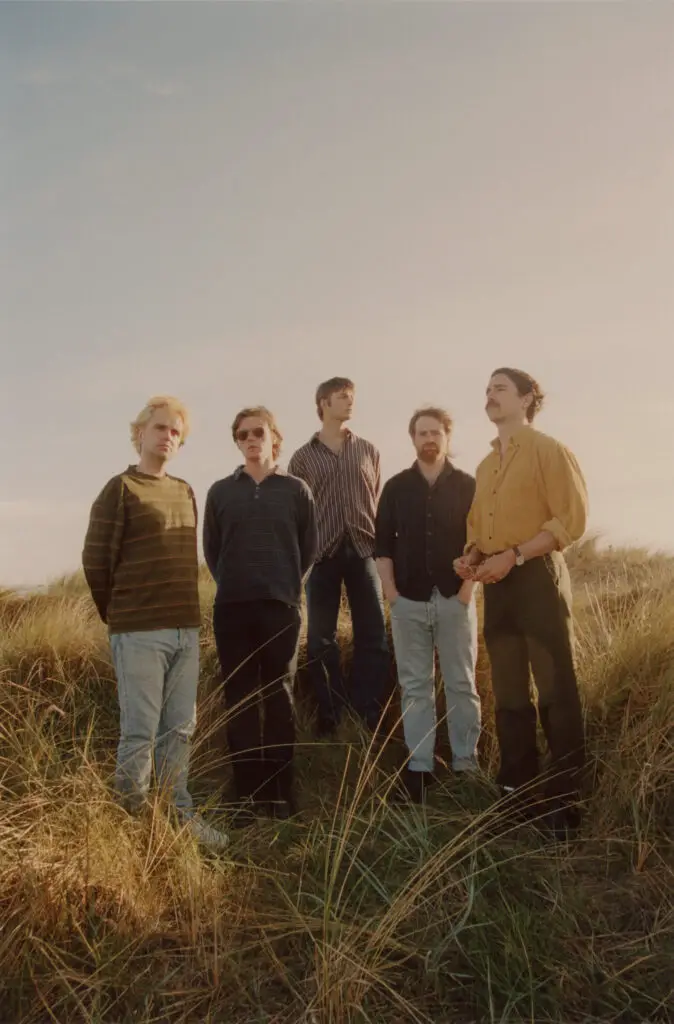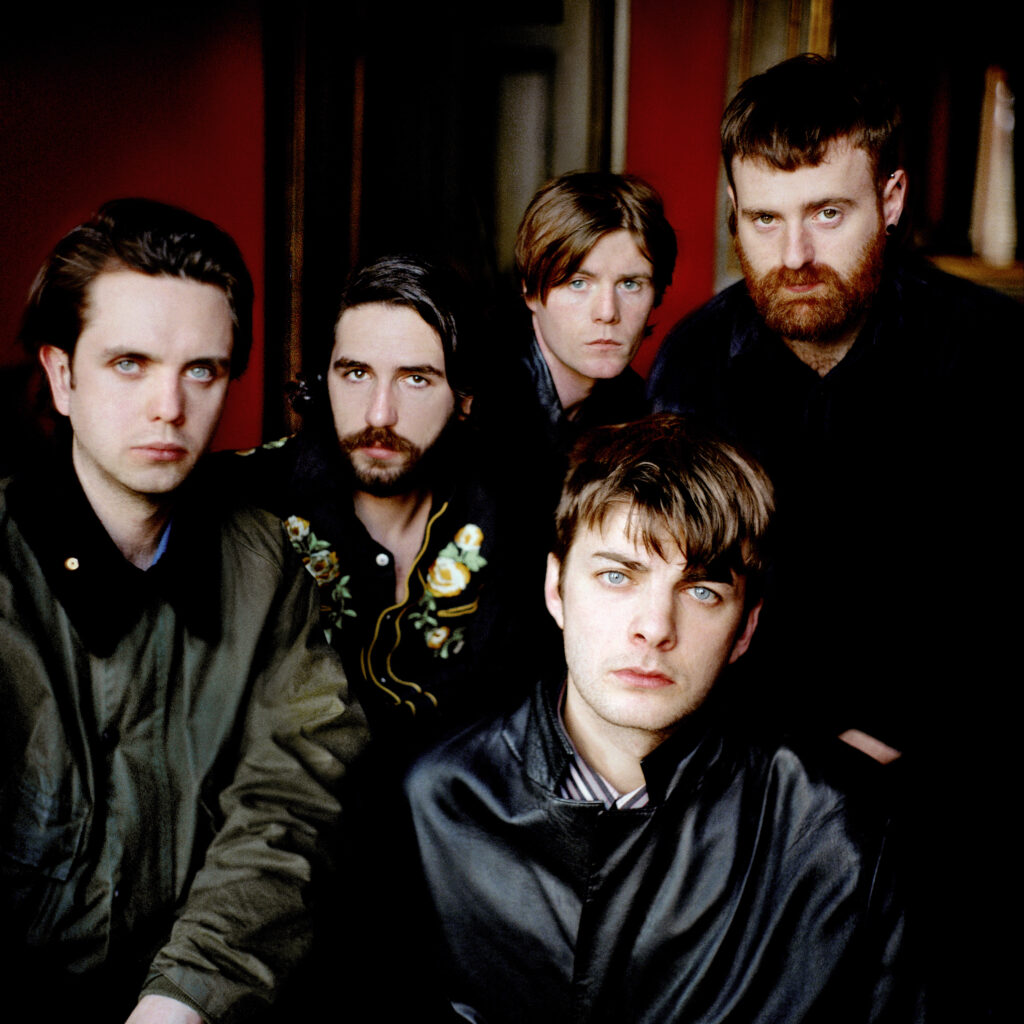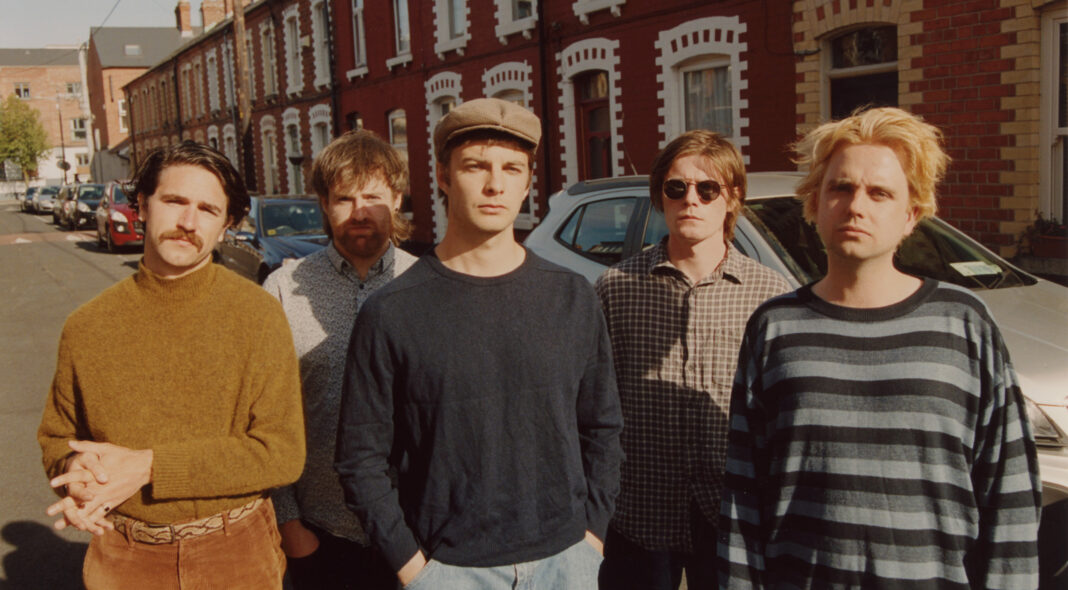Even a master teller can find their own stories coming back to bite them in the bum. Fontaines DC’s first album, ‘Dogrel’, was richly praised for its vivid, oblique lyrics, glimpses of lives flashing by in the dark night of its jagged, rollicking riffs. Rightly beloved, it was nominated for the Mercury Prize and scored a Top 10 for their independent label, Partisan.
But around any success, narratives form, and Fontaines DC soon found themselves dragging around a burgeoning legend of romantic, angry young Irish men riding a wave of resurgent post-punk guitar music: in critic maths, essentially Arctic Monkeys + Public Image Limited x James Joyce’s Dubliners.
Not necessarily a problem: you can sum most band’s debuts up in an elevator pitch if you want to. But come album No 2, it’s time to break out of your own mould if you want a future. And on ‘A Hero’s Death‘, Fontaines DC are coming out swinging: “You won’t catch me/Not in your beartrap loyalty,” singer Grian Chatten warns devotees of ‘Dogrel’ on the hypnotic, salty thrash of ‘I Was Not Born’.
“We were pigeonholed to an extent by the media,” he says, blearily peeling an orange as he stares down his webcam after a bad night’s sleep in the north London flat he’s just moved into with his fiancé. “We would just get called post-punk and all that kind of craic, and get thrown into this group of bands – it’s always us, Idles and Shame… I bear no resentment about anything like that whatsoever, and I love both bands. The thing that was more insidious was people telling you how much they love your music. That’s a slow-moving danger, like. Because it’s just so inviting. And once you go down there, and you follow that compliment, it’s the same place where criticism can hit you. You’re in the firing line for all feedback. Those songs of defiance are more geared towards that vague notion of expectation.”

If you expected an aggressively triumphant return, ‘A Hero’s Death’ will thwart you; the band acknowledge the record is intended to kill off one idea of who Fontaines DC are. For them, it died when touring ‘Dogrel’. Feeling trapped by a punishing itinerary and increasingly at odds with each other, in the tour van they reached for the succour of softer, sadder music: Lee Hazlewood, Broadcast, the Beach Boys. Inspired by the latter’s haunting harmonies, they worked on their own, finding comfort and renewed companionship in their voices mingling.
“Our schedule made dreaming necessary,” says Grian. “We listened almost exclusively to music that was conducive to dreaming. Even ‘The Breaking Hands’ by The Gun Club… all of it was music that sounded like it might have been coming from underwater and created a place for us to rest our heads… we needed to poke a hole in the tyre and let some air out, and that’s what this album was.”
Intimate and inward-looking, with a mottled mood and a sense of possibility, ‘A Hero’s Death’ should redefine them as a band with a future full of surprises. And yet they very nearly went the classic overblown-second-album route, heading into LA’s storied Sunset Sound studio with Nick Launay, who produced Gang of Four, PiL and Killing Joke. Perfect as it sounds on paper, things didn’t come together, and in the autumn they headed back to British producer Dan Carey’s studio in south London, where ‘Dogrel’ was made.
“For the record to be the way it is now, it was necessary for us to go to Sunset Sound and lose the plot a bit with it,” guitarist Carlos O’Connell explains from the veranda of his parent’s house in Madrid. “To try a lot of stupid things that we were asked to do and then try a lot of things that we thought were gonna be great… I don’t think we were as sure of the album before we went into Sunset Sound as before we went into Dan Carey’s.”
Though the band now feel certain of themselves, ‘A Hero’s Death’ itself makes a virtue of uncertainty. ‘Love Is the Main Thing’ doesn’t sound completely convinced by its own title, spiralling down with circling licks that shift increasingly, unsettlingly off-kilter. On the title track, Grian repeats “life ain’t always empty” like he’s trying to talk himself into it, until the words stop making sense, his bandmates’ “ba ba bas” bringing a sense of surreal satire.
“I like the idea that it’s insincere, or it’s not stable,” he says. “It’s precarious in its positivity, in its optimism, that’s why it goes from D major to D minor. As soon as you feel like you’ve got a secure footing, it kind of just tilts a bit. It’s like a smile that’s brandished as opposed to felt.”

The song’s final line, “that was the year of the sneer/Now the real thing’s here”, makes a manifesto of their expansion. “In a way that was me addressing the wave of what people called post-punk revival bands,” says Grian. “Just us wanting to progress beyond that formula that was relevant and that worked and begin to actually just express ourselves… to rise out of a scene with the ability to do whatever we want.”
The video is a step forward too, the band stepping to one side to let the focus fall on actor Aiden Gillen, who plays a talk-show host trapped in a loop and falling apart at the seams, persecuted and sidelined by his bird puppet co-host. Gillen and the band are mutual fans (Grian’s favourite Game of Thrones character was Gillen’s scheming, social-climbing Littlefinger, who once said: “Always keep your foes confused. If they don’t know who you are, what you want, they can’t know what you plan to do next”).
“To watch an actor of that calibre working was really interesting,” says Carlos. “Even if he wasn’t being shot, you could still sense that the person that you shook hands with the day before just wasn’t really there. When we finished that shoot, he had to leave because he was so paranoid and messed up from how weird the whole thing gets at the end… there was a lot of improv going on between him and the puppeteer, who was absolutely ripping into him to make him feel really bad and uncomfortable… it was quite uncomfortable to watch.”
Similarly, Grian’s spoken about how, at the darkest moments of the ‘Dogrel’ tours, he found himself too disconnected from the songs to sing them, and was forced to dredge up bad memories to get in the right bristling headspace. The band have some of their biggest live dates yet booked in for spring 2021, including a night at Alexandra Palace; like everyone else, they’ve no clue what might happen before then, but Grian’s hopeful that when they do get back onstage, things won’t have to be so Method.
“There’s more colours in our palette now,” he says, “more opportunity to express how I’m actually feeling onstage then and there without having to square-peg-in-a-round-hole it… also, I’ll probably take care of myself more on tour. When it’s a year and a half on the road, you can be six months in and think that you’re fine. It’s like you’re looking ahead, but there are things falling out of the back of your head.”
It was only about three months into lockdown that he started feeling normal again. He’s hopeful this enforced downtime might have lasting positive effects for many. “People could be coming out of this with a relationship with themselves that might not necessarily have had one before, who might really have relied on external stimuli. Hopefully a lot of people have been challenged to be OK with their own company, you know?”

In a strange way, the dreamworld of ‘A Hero’s Death’, with its circling repetitions and changeable moods, has been perfectly suited to this time of not-always-gentle self-reflection. No, the softly stirring, almost anthemic closing track, rejects self-destructive habits with frankness and forgiveness: “There’s no living to a life/ Where all your fears are running rife.” It almost sounds like they’re singing to their old selves.
“I always thought it was about my grandad, and then maybe a bit about my dad as well,” says Grian. “But when I write lyrics, I think what happens is that you start to become aware of a feeling you have, a formless feeling. And you filter it through the experiences of people around you who you empathise with… then maybe six months after we record it, I’ll realise that it was probably really about me. With that tune, the gentleness and the heaviness… to be truly gentle is quite heavy, do you know what I mean? To sit down and have a difficult conversation about how much you care for someone and how much you might be worried about someone. That can be incredibly hard.”
“Harder than having an argument with someone,” says Carlos.
“Having an argument is easy,” Grian concurs. “Having a compassionate conversation about why you need to feel the need to argue is a lot harder. I think Deego [bassist Conor Deegan] said that song sounds like standing at the bottom of a mountain, and appreciating the size and impossibility of the mountain, and then deciding toward the end of it that you’re going to give it a go.”
Having climbed their own mountain, Fontaine’s DC are at rest now with who they are. It’s a good time to get to know them again.
‘A Hero’s Death’ is out now on Partisan; on Monday 3 August, the band will stream A Night in Montrose, Dublin, a performance of the album in full







